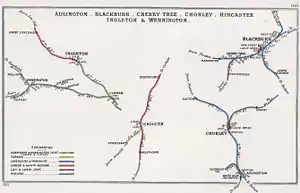Hincaster branch line
The Hincaster branch was a single-track railway branch line of the Furness Railway which ran from Arnside on the Furness main line to a junction with the Lancaster and Carlisle Railway (later the London and North Western Railway) at Hincaster.[1] Intermediate stations were provided at Sandside and Heversham, with the main engineering work being a substantial 26-arch viaduct over the River Bela near Sandside.[2]
| Hincaster branch line | |
|---|---|
| Overview | |
| Locale | Cumbria, England |
| History | |
| Opened | 1876 |
| Closed | 1966 |
| Technical | |
| Track gauge | 4 ft 8 1⁄2 in (1,435 mm) standard gauge |
Hincaster branch | ||||||||||||||||||||||||||||||||||||||||||
|---|---|---|---|---|---|---|---|---|---|---|---|---|---|---|---|---|---|---|---|---|---|---|---|---|---|---|---|---|---|---|---|---|---|---|---|---|---|---|---|---|---|---|
| ||||||||||||||||||||||||||||||||||||||||||

Traffic
It was built primarily for use by mineral trains carrying coke and iron ore from County Durham to various ironworks in and around Barrow-in-Furness which had previously had to travel (and reverse) via the busy junction at Carnforth.[3] The branch was opened in 1876 and also carried a passenger service between Grange-over-Sands and Kendal known locally as the Kendal Tommy.[4]
Closure
The passenger service ended on 4 May 1942 and the track between Sandside and Hincaster Junction was lifted in 1966 (through traffic having ceased three years earlier). A short stub from Arnside to Sandside lasted until 1972 to serve local quarries.
Sections of the old trackbed survive and are used as a footpath and cycleway, though the viaduct and both intermediate stations have been demolished.
Ownership
| Preceded by London and North Western Railway |
Lancaster and Carlisle Railway | Succeeded by London, Midland and Scottish Railway |
Notes
- Conolly, 1997, p.24
- "Bela Viaduct" Old Cumbria Gazetteer; Retrieved 26 June 2017
- Marshall, p.104
- Heversham - A Website history by R.K Bingham www.heversham.org; Retrieved 2009-06-24